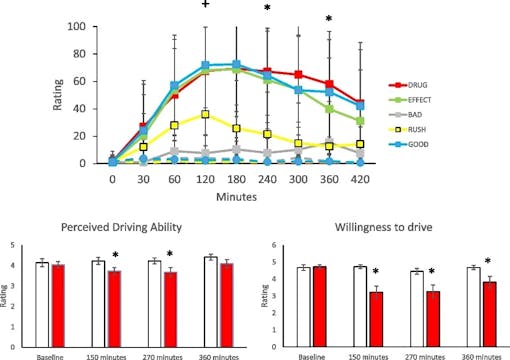A recent study found that using cannabis edibles left drivers feeling less willing to drive, and driving at slower speeds. Furthermore, the study also found no statistically significant differences from the sober controls when it came to measures of driving ability. And importantly, there was no correlation found between driving impairment and blood THC levels.
That’s important new data, given the ongoing politics of legalization rolling out across America, where fears of stoned driving have long-driven critics’ objections. Florida will vote on legalization this fall.
The study, published in the Journal of Cannabis Research, is the first to investigate the impact of cannabis edibles on driving—as opposed to smoking. That’s important because edibles hit differently. While there have been many studies investigating inhaled cannabis’ impact on driving, these authors wanted to investigate edibles because THC takes longer to kick in and feels different when you eat it. Since edibles are a popular way to consume cannabis, it’s crucial to understand how they might impact safety for everyone on the road.
Drivers on edibles had so few collisions that researchers could not even evaluate that factor in their final analysis.
Adding to the research on driving high
Previous research has found mild impairments for driving under the influence of cannabis – specifically increases in weaving back and forth. These impacts tend to be more drastic for those who aren’t regular cannabis users. Frequent consumers have shown less impairment from cannabis than those who use cannabis occasionally, likely due to building a tolerance to cannabis’ disorienting effects.
Still, unlike alcohol, research suggests that cannabis leads to less risk-taking behaviors, slower speeds, and lower confidence in driving ability—which may reduce the overall impact of the impairments. This may be why some evidence suggests there are no increases in traffic fatalities when recreational cannabis laws are adopted.
Do drivers on edibles perform differently?
To study how cannabis edibles impacted driving, researchers set up an experimental design where participants consumed their preferred edibles and then tried out a driving simulator. These edibles varied by the individual and included gummies, chocolates, cookies, and brownies with an average dose of 7.3 milligrams of THC—a pretty standard amount. The researchers also measured blood THC levels and assessed the participants’ feelings after they took their edible.
The study occurred in Toronto, Canada, and included 22 people ages 19-74 with valid driver’s licenses. Participants abstained from cannabis for 72 hours before the experiment. Researchers took baseline THC levels and ensured no other psychoactive drugs or alcohol had been taken before the driving test.
To add some controls to the experiment, the researchers had participants do a practice session on the simulator. Then they conducted test sessions where participants were either given their chosen edible or a cannabis-free placebo edible 120 minutes before simulated driving. Driving took their tests at 120, 240, and 360 minutes after taking the edible.
Shop highly rated dispensaries near you
Showing you dispensaries nearDuring these simulations the researchers measured weaving in and out lanes, speed, how much their speed varied, braking, and how many collisions they had. Following each drive, participants took surveys on how high they felt and how well they thought they handled the car.
Study finds no driving impairment on edibles
After analyzing the results, researchers found that cannabis edible intake led to slower driving speeds after 2 hours–but this effect vanished by hour 4. Still, they found no differences between controls and edible consumers when it came to lane weaving, reaction times for hitting the brakes, or variation in speed—even when researchers made the drivers check their phones or radio. Drivers on edibles had so few collisions that researchers could not even evaluate that factor in their final analysis.
Interestingly, they also found no correlation between blood THC levels and driving impairments.
Despite the safe driving, the high drivers reported feeling stoned. They reported an altered subjective experience for 7 hours, and less willingness to drive for 6 hours after they used their edible. They also reported less confidence in their driving ability—rating their own driving performance lower from 150 to 270 minutes after consuming cannabis.

Limitations and future research directions
While an important step in assessing the impacts of edibles, this study had limitations. Importantly, this is a very small study, with a sample size of only 22. Most of the participants were white and male, which limits how far we can generalize these results to apply to everyone. They also didn’t include data or analysis of weight, which might alter the absorption of THC when taken as an edible.
This was also not a blinded study—which is ideal. Participants brought their own preferred edible, so they likely knew whether they got a placebo or their edible. This could shift results due to the placebo effect.
Future studies should focus on replicating these results with a double-blinded methodology and a larger, more representative group of participants.
While this study didn’t find any major driving impairments from edibles, this doesn’t mean it’s safe to drive on cannabis. Larger and more rigorous studies are needed to confirm these results. And it’s certainly notable that the participants themselves didn’t feel confident driving. Until we have more conclusive evidence, it’s best to play it safe (and legal) and avoid driving high! Take mass transit or a shared ride, and if you do drive—give it your full attention, and avoid distractions and speeding.




